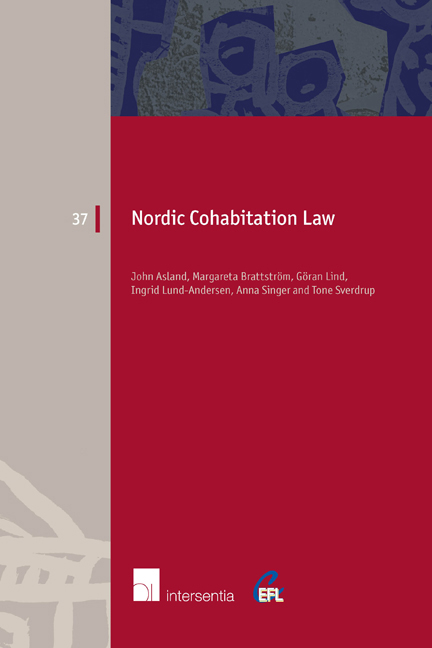Book contents
- Frontmatter
- Preface
- Contents
- Table of Cases
- List of Abbreviations
- Chapter 1 The Development of Cohabitation and Cohabitation Law in the Nordic Countries
- Chapter 2 Property Issues in Cohabitation Relationships
- Chapter 3 Financial Settlements on Termination of Cohabitation
- Chapter 4 The Legal Position of the Surviving Cohabitant
- Chapter 5 The Relevance of Cohabitation for Parental Rights
- Chapter 6 The Distinctive Legal Nature of Cohabitation Relationships and the Need for Legislation
- Chapter 7 Discussion of Legal Policy: Principles for Regulating Cohabitation Relationships
- References
- About the Authors
- European Family Law Series
Preface
Published online by Cambridge University Press: 13 December 2017
- Frontmatter
- Preface
- Contents
- Table of Cases
- List of Abbreviations
- Chapter 1 The Development of Cohabitation and Cohabitation Law in the Nordic Countries
- Chapter 2 Property Issues in Cohabitation Relationships
- Chapter 3 Financial Settlements on Termination of Cohabitation
- Chapter 4 The Legal Position of the Surviving Cohabitant
- Chapter 5 The Relevance of Cohabitation for Parental Rights
- Chapter 6 The Distinctive Legal Nature of Cohabitation Relationships and the Need for Legislation
- Chapter 7 Discussion of Legal Policy: Principles for Regulating Cohabitation Relationships
- References
- About the Authors
- European Family Law Series
Summary
Cohabitation is now widely and socially accepted in the Nordic countries. Legal distinctions between spouses and cohabitants are less and less frequent. This development has probably enticed some cohabitants to believe that they have a legal protection in a similar way as spouses – but they don't. With the exception of Sweden, and to a certain extent Finland, the regulation of cohabitation in the Nordic countries is characterised by non-statutory law and discretionary compensation rules. Litigation in the wake of dissolved cohabitation testifies to a complex and oft en unclear legal situation, where some cohabitants risk leaving a long-term relationship empty-handed.
This book gives an account of the rules on cohabitation in all five Nordic countries. It describes inter alia the regulation concerning property law during cohabitation and on the financial settlement after the dissolution of cohabitation as well as the main features of inheritance law and child rights legislation for cohabitants. The legal developments towards the current state of the law are also described. Against this background the questions is raised whether the current rules in the Nordic countries are capable of solving the problems that arise in this legal context. In a final chapter the book includes suggestions for legal principles for the regulation of cohabitation.
The aim of the book is twofold. It gives an overall legal representation of the rules of cohabitation which can be useful both for lawyers, judges and other legal practitioners. But the discussion of legal policy and suggestions for solutions could be of interest for politicians and lawmakers interested in the Nordic region. Since legal culture and demographics are fairly uniform in the Nordic countries, it is possible to draw fruitful parallels between countries – in this field of law the Nordic countries can learn from each other, but others can also learn from us. The Nordic countries could actually be seen as a test case for different approaches to regulation of cohabitation.
The book is written by a group of Nordic professors including John Asland, University of Oslo; Margareta Brattström, Uppsala University; Göran Lind, Örebro University; Ingrid Lund-Andersen, University of Copenhagen; Anna Singer, Uppsala University; and Tone Sverdrup, University of Oslo. Professor Urpo Kangas, University of Helsinki and Professor Hrefna Friðriksdóttir, University of Iceland have made important contributions to the description of, respectively, Finnish and Icelandic law.
- Type
- Chapter
- Information
- Nordic Cohabitation Law , pp. v - viPublisher: IntersentiaPrint publication year: 2015



